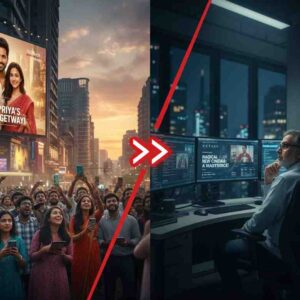Mumbai – 2025
The camera stops rolling. The character’s arc is complete. The costume is packed away. But for the actor, something lingers—a vacuum that words, applause, or wrap parties can’t quite fill.
In India’s fast-paced, role-to-role cinema industry, few conversations address what happensaftera film ends. Yet more actors are quietly naming it:Post-Film Depression—a complex psychological state where creative release turns into emotional loss, identity withdrawal, and sometimes, clinical symptoms of depression.
As Indian cinema matures in its storytelling, it’s time the industry also matures in how it cares for its storytellers.
The High of Immersion—Then the Crash
During shooting, actors often live:
- Structured routines with strict schedules
- Emotional immersion in characters with heightened states
- Constant external validation from co-stars, crew, and media
- A sense of “being someone with purpose”
But once the film wraps:
- That emotional architecture collapses
- Social contact drops off
- The intense internal work goes unrewarded or unrecognized
- The actor re-enters a world that hasn’t moved with them emotionally
For many, the result isa psychological comedown that feels like withdrawal.
Symptoms of Post-Film Depression
While not officially classified as a clinical disorder, post-film depression mirrors:
- Lethargy and sleep disturbance
- Loss of creative motivation
- Irritability or mood swings
- Nostalgia for the role, crew, or even on-set environments
- Difficulty reconnecting with one’s own identity after inhabiting another so fully
In some cases, these symptoms last forweeks or months, especially after intense or trauma-related roles.
The Indian Context: Silence and Self-Blame
In Bollywood and regional film industries, mental health support is minimal:
- Breaks are frowned upon, seen as signs of laziness
- Actors are expected to “move on” quickly to the next project
- There’s no emotional debriefing infrastructure, even on psychologically demanding films
- Suffering is romanticized, often seen as a mark of “commitment to craft”
As a result, many actors blame themselves for what is, in reality,a neuro-emotional reset their body is demanding.
Vulnerability Isn’t Hierarchical
Post-film depression doesn’t just affect newcomers.
Veteran stars, method actors, and even comic performers report:
- Emotional hollowness after leaving a beloved character
- A loss of routine that triggers existential aimlessness
- A recurring desire to relive the production emotionally, even if the shoot was physically exhausting
One actor noted, “I gave everything to that role. When it ended, it felt like a part of me died quietly, without a funeral.”
Global Parallels, Local Absence
Internationally, actors likeHeath Ledger, Joaquin Phoenix, Andrew Garfield, andFlorence Pughhave spoken about post-role mental distress.
Some productions abroad:
- Hire psychological consultants to assist actors during decompression
- Schedule “cool-down” workshops post-wrap
- Integrate therapy into actor contracts, especially for trauma-based roles
In India, this practice isvirtually unheard of.
What Can Be Done
To address post-film depression meaningfully, the industry needs:
- Mandatory decompression days before actors transition to the next project
- Post-project mental health briefings or counselling sessions
- Studio-supported mental wellness sabbaticals
- Recognition of emotional effort as billable labour
- Peer spaces where actors can discuss this without judgment or career risk
Final Word
When the credits roll, a film ends for the audience—but for the actor,the echo often lasts much longer.
In a business that celebrates characters, the industry must also learn to care for the humans who carry them.
Because wrapping a film shouldn’t meanunwrapping your sense of selfwithout support.










